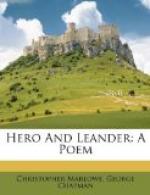|
This section contains 7,195 words (approx. 24 pages at 300 words per page) |

|
SOURCE: Altieri, Joanne. “Hero and Leander: Sensible Myth and Lyric Subjectivity.” John Donne Journal 8, nos. 1-2 (1989): 151-66.
In the following essay, Altieri assesses Marlowe's achievements with Hero and Leander and considers Chapman's continuation of the poem.
If we take seriously recent work with Hero and Leander, we can recognize in the poem far broader implications for Marlowe and for the poetry of the 1590s than those pursued by the original scholars, who were interested in discrediting Chapman's claims on the poem. Both Roma Gill and Marion Campbell, following Louis Martz,1 have put before us a poem that is unique, having no real heirs, in effect sui generis in English. Gill's edition dispenses with Chapman's continuation on editorial grounds. Campbell, not content with dismissing the “Sestiads” and their concomitant epicization of the narrative, argues firmly that Chapman's continuation constitutes an appropriation and thorough realignment of the poem toward moralized...
|
This section contains 7,195 words (approx. 24 pages at 300 words per page) |

|


